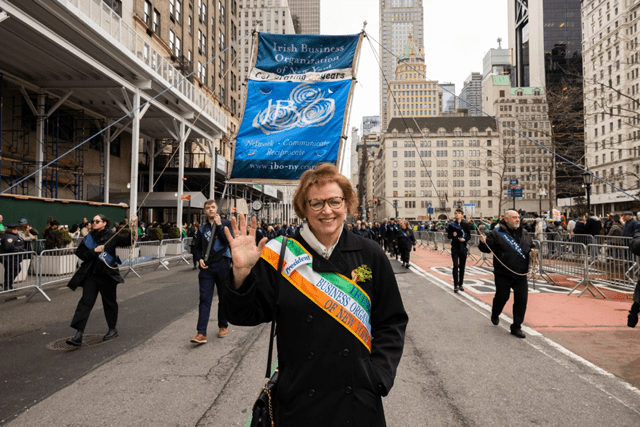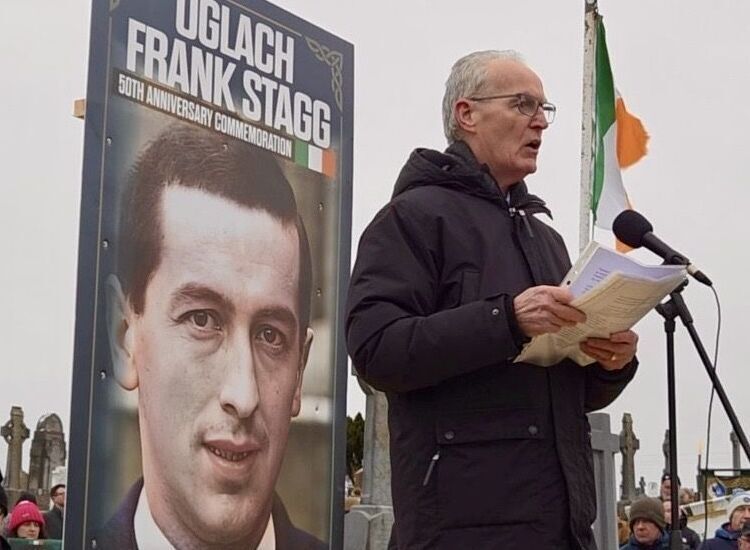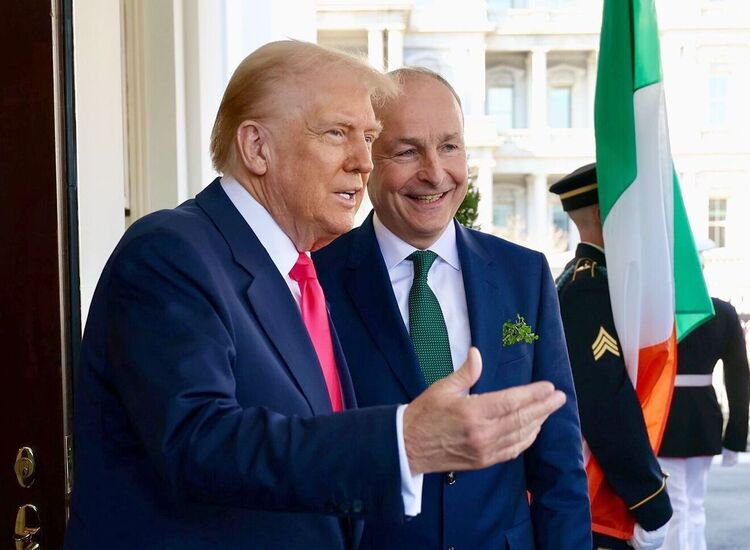For Dr. Janet L. Walsh, attention to detail is key.
She learned that during the earliest days of her career, for instance at a loading dock in her first job straight out of college. You might ask the president of the Irish Business Organization of New York about that and also about the “golden rule,” or at least the international business person’s version of it.
Walsh was an experienced world-traveling corporate executive when, 26 years ago, she decided to build her own company, Birchtree Global, to cater to businesses that want to expand their operations overseas, and or those that want to set up in the U.S. Later, she started a subsidiary, Birchtree Performance HR, which “works to increase the financial performance on the human capital side.”
Birchtree Global, LLC advises on the legal, financial, tax and human-resources aspects of setting up in other countries.
“We put in place the infrastructure to help those companies get up and running with a bespoke, very curated team around them. We also train those individuals in the company so the company can be self-managing,” she said.
Birchtree Global’s training programs “help people understand how international business works and some of the things they have to think about to maximize the company’s strategy.
“We help companies to understand the tradeoffs,” the president and CEO added. “If you want to locate in let’s say France, you may not be aware of the hiring and firing practices there. But it’s extremely difficult to terminate people, especially if your company is doing well. As you grow you need specialists, but you’re not necessarily going to be able to let those [initial employees] go or repurpose them.
“But the tax deal you get in France could work in your favor,” she said.
Walsh gave a real-life example of a company that wanted to set up in two European countries recently; ultimately Birchtree recommended Ireland, in preference to the UK because of its EU membership, and Germany.
“We give people and companies the whole picture,” she said.
Walsh teaches courses at four universities and colleges — Columbia, Fairfield, Manhattanville and Stony Brook — and in that endeavor, as well as more generally, she has been an advocate for the various academic structures that companies can use to capture data as they develop a strategy and create an operation on the ground.
A SWOT analysis, for example, refers to “strengths, weaknesses, opportunities and threats,” while a PESTAL analysis focuses on the “political, economic, social, technological, environmental and legal” factors.
“There are any number of templates or structures you can use,” the IBO’s president said, that “can be very illuminating and very helpful.”
Walsh herself has advanced degrees from Loyola University (MBA) and from the University of Phoenix (Doctorate in Business). She was raised in Topsfield, Mass., by parents who valued education and who’d experienced the world beyond America’s shores as young adults and continued to travel with their children.
William P. Walsh Jr., was a U.S. army lieutenant who led his unit through the front gates of Dachau in 1945. Both of his parents were from County Clare; his father fought for the U.S. in World War I and later joined the Boston police department.
“All their children and grandchildren were in business,” Walsh said of the immigrant couple. As a young person she saw older cousins go into international business with companies like Coca Cola.
Her mother, Dr. Ruth Walsh, who died at age 96 last year, grew up in a family that had been in Alabama since the 1700s. As a young woman she followed the business path her sister had made to Venezuela, where the family had become friendly with Amílcar Segura, a composer and founder of Radio Barquisimeto, whom she described as the “Latin American version of Ed Sullivan,” and visited regularly. Indeed, Ruth was in Venezuela during the military coup of 1948.
The Latin American connections would be maintained after the Walshes settled down in Massachusetts.
Janet Walsh’s father, who worked initially as a salesman, was the town manager, while her mother was the school principal,
“I couldn’t be bad,” she joked. “I never had any fun growing up.”
She can, though, trace her life-long passion for equestrian sports to learning to ride a horse from age 3.
Walsh was an exchange student to El Salvador during high school. Even at that young age she became aware of the triangular trade between Central America, Japan and the U.S, and also that the Parti Québécois north of the border with Canada took a keen interest in developments.
She studied economics at Bucknell University in Pennsylvania with a concentration in Japanese. In her first week as a college student she followed up on a “Help Wanted” sign and it led to a job in the food service industry.
After graduation, the IBO’s president continued to work in that sector, specifically for a company that serviced the University of Maryland. She quickly learned how to manage budgets and how to manage people. It was in the latter context that the loading dock became an issue. She complained about raccoons disturbing the trash there; however, one worker’s very effective response led to a “commotion” on campus. “He was doing it for me out of the goodness of his heart,” Walsh said, but added she recognized “that students don’t want to come in and see you cutting up raccoons on the loading dock.”
She found an alternative solution to the problem, while also thanking the worker and explaining to him that the students regarded the animals almost like the family cat or dog at home in the city. They didn’t understand country ways. She then wondered silently if whether she hadn’t at some point kissed the blarney stone.
Meanwhile, her own dissatisfaction with days that began at 5 a.m. and might end at 10 p.m. was setting in.
“I hadn’t had a day off in months,” said Walsh, who realized that she missed spending time with her horse.
Then she got a break with Equitable Bank, and the vacancy happened to be in HR, where a manager was recovering from a heart attack. A glittering career was born.
In time, Walsh outlined her vision for what became Birchtree Global. It was in Asia on the cusp of a new century at a branch of the Hard Rock Café. “Adult beverages were involved,” she remembered. According to Birchtree’s website, the company’s future CEO and president and other women industry leaders on a state visit to Shanghai, China, were lamenting the “lack of independent global, business advisory services. They wanted advice from business people who knew how to globalize strategy, businesses, and people.
“They wanted unbiased recommendations to solve their complex challenges, not global advice from a company with a ‘one size fits all’ product to sell.”
“It’s worked out splendidly,” she said, a quarter of a century later.
Walsh has been to 86 countries and all 50 U.S. states. When asked to pick some favorite places, she cited Istanbul, Turkey, and Sydney, Australia. And then added Cairo. “You could not ask for kinder people,” she said of the Egyptians.
Walsh, who developed a particular fondness for California, is something of a student of differences between regions in the U.S.,
For her, Albany, New York, is very different to New Orleans. “I was very struck by the cultural differences when I took a job in Atlanta,” she recalled. Her mother’s South, she discovered, is a place where it helps “to sit on the porch a while.”
Up North, they’re happy to get to know you gradually over time; in the South, they want to get personal early on.
Internationally, the “golden rule,” i.e, gold rules or “money talks,” generally works. Folks want to get the deal done.
But in building friendships it’s necessary to be aware of cultural mores. When Walsh stopped once to take a photograph of an old aqueduct in Mexico, the attitude locally was, “Here’s somebody taking the time to know something about our country.”
And displaying some knowledge of Japanese speaks volumes in Tokyo: “You know about us, you’re a friend of Japan.”
When Walsh is not advising business people, she has a range of other enthusiasms, many of them shared with her significant other, Henry Ross. They met soon after she saw the “Help Wanted” notice back in her first week as a college student. “He was my first boss, my first crush and a long-time friend,” she said.
They both lost their partners in recent years and became a couple.
“He is wonderful,” she said.
Walsh served recently on the board of the Explorers Club on East 70th Street. Membership has always been confined to bone fide explorers, such as, famously, President Teddy Roosevelt. She was elected a member for her archaeological discovery and excavation of a mid-Archaic period settlement on Pumpkinvine creek in Georgia.
Additionally, the champion equestrian in cross-country and pleasure division competitions has maintained her interests there.
And Walsh the painter is known for her western horse pictures, which are exhibited in the Booth Museum of Western Art in Cartersville, Ga., the largest western art museum in the United States.
Then, of course, there is the IBO.
“We’ve an idea for you,” she summarized the approach in 2024 from its leaders. She was surprised when they said they’d like her to be president.
“I was thinking something a little more modest,” she said with a smile.
The new president began her two-year term in January with the inevitable strategic plan, which includes developing what the IBO is already doing very well and broadening into new areas, some of which involve her areas of expertise and experience.
“They are spectacular. I cannot say enough about the people I’m working with,” Walsh said of the members of IBO’s various committees. “They are just the nicest people, so kindhearted and so professional.”










